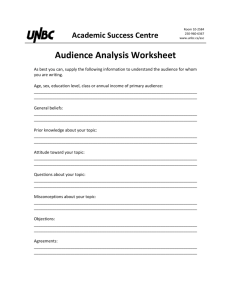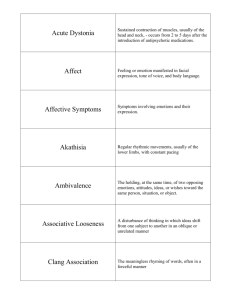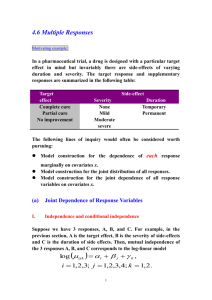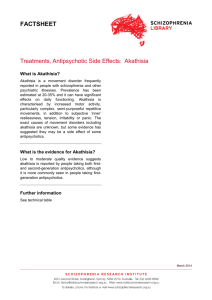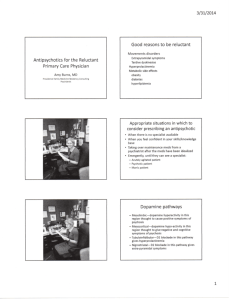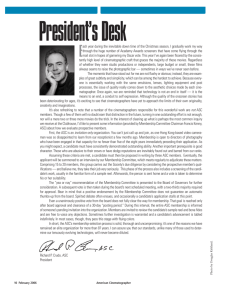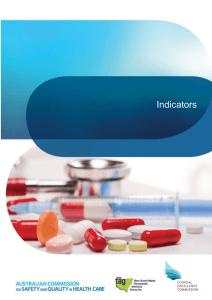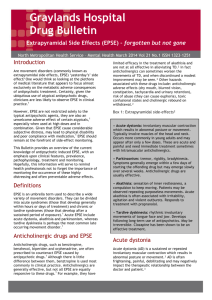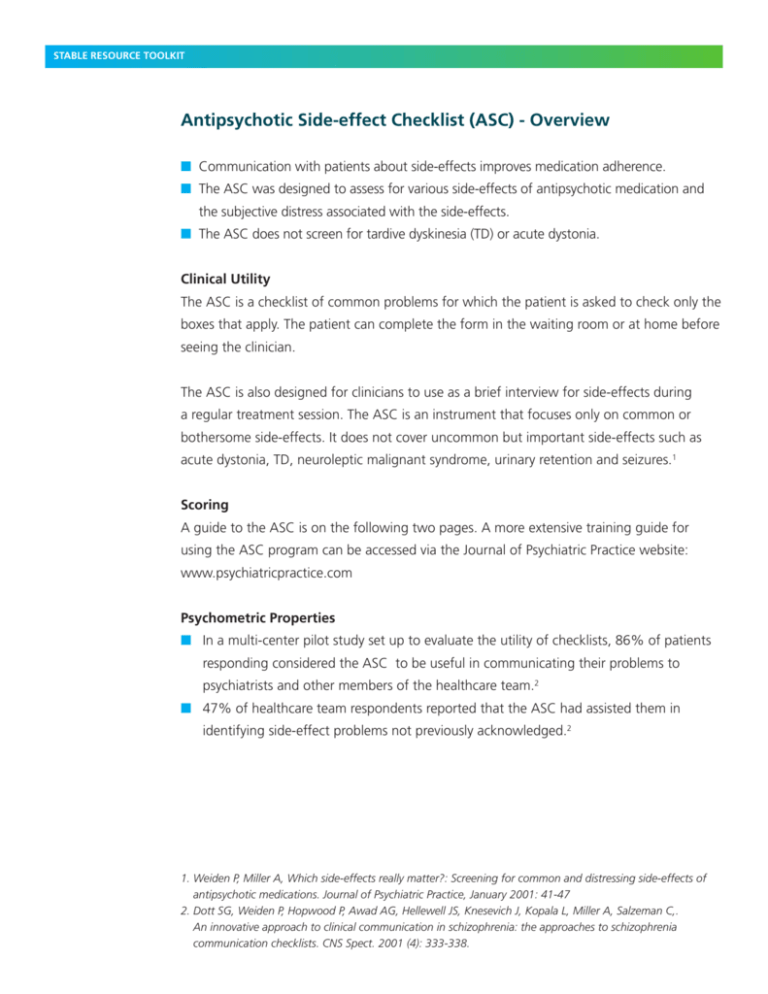
STABLE RESOURCE TOOLKIT
Antipsychotic Side-effect Checklist (ASC) - Overview
n C
ommunication with patients about side-effects improves medication adherence.
n T he ASC was designed to assess for various side-effects of antipsychotic medication and
the subjective distress associated with the side-effects.
n T he ASC does not screen for tardive dyskinesia (TD) or acute dystonia.
Clinical Utility
The ASC is a checklist of common problems for which the patient is asked to check only the
boxes that apply. The patient can complete the form in the waiting room or at home before
seeing the clinician.
The ASC is also designed for clinicians to use as a brief interview for side-effects during
a regular treatment session. The ASC is an instrument that focuses only on common or
bothersome side-effects. It does not cover uncommon but important side-effects such as
acute dystonia, TD, neuroleptic malignant syndrome, urinary retention and seizures.1
Scoring
A guide to the ASC is on the following two pages. A more extensive training guide for
using the ASC program can be accessed via the Journal of Psychiatric Practice website:
www.psychiatricpractice.com
Psychometric Properties
n In a multi-center pilot study set up to evaluate the utility of checklists, 86% of patients
responding considered the ASC to be useful in communicating their problems to
psychiatrists and other members of the healthcare team.2
n 4
7% of healthcare team respondents reported that the ASC had assisted them in
identifying side-effect problems not previously acknowledged.2
1. Weiden P, Miller A, Which side-effects really matter?: Screening for common and distressing side-effects of
antipsychotic medications. Journal of Psychiatric Practice, January 2001: 41-47
2. Dott SG, Weiden P, Hopwood P, Awad AG, Hellewell JS, Knesevich J, Kopala L, Miller A, Salzeman C,.
An innovative approach to clinical communication in schizophrenia: the approaches to schizophrenia
communication checklists. CNS Spect. 2001 (4): 333-338.
STABLE RESOURCE TOOLKIT
Guide to the ASC-Clinician Version1
Extrapyradmidal Symptoms (EPS)
n R
efers to the movement disorders that occur when there is a disruption of the brains
extrapyramidal system
n C
an be caused by antipsychotic agents, both 1st and, to a lesser extent, also by 2nd
generation agents
n A
kathisia: a motor restlessness; inability to resist the urge to move; pacing and inability
to sit still are common
n D
rug-induced Parkinsonian symptoms: tremor and muscle rigidity; also with extreme
slowness of movements
Severe Extrapyradmidal Symptoms not captured by the ASC-C:
n A
cute Dystonia: sudden muscular contractions; often produces neck or jaw spasms or
cause eyes to roll up
n T
ardive Dyskinesia: spasmodic involuntary movements; writhing-like movements are
common in the face, mouth, tongue and hands. Assess dyskinesia using the Abnormal
Involuntary Movement Scale (AIMS) (available in STABLE Resource Toolkit)
Item
Problem
Corresponding Side-effect
1
Loss of energy or
drive
Akinesia: Also known as “bradykinesia” means slowing
down of movements. A person with akinesia may appear
listless or lifeless or the face may loose its usual range of
expression. Item 1 covers the physical aspects of akinesia.
2
Feeling unmotivated
or numb
Akinesia: A person with akinesia commonly complains
of “feeling like a zombie” or having a subjective feeling
of being “slowed down”. Item 2 covers the internal
aspect of akinesia.
3
Daytime sedation or
drowsiness
Sedation: Common side-effect of some antipsychotic
medications
4
Sleeping too much
Sedation: Common side-effect of some antipsychotic
medications
5
Muscles too tense
or stiff
Muscle Rigidity: (EPS) Antipsychotics can make a
person’s muscles too firm or tense. Muscle rigidity from
EPS can cause a person to walk slowly with small steps.
6
Muscles trembling
or shaking
Tremor: (EPS) A repeated shaking movement of
the person’s muscles; a side-effect of antipsychotic
medication.
1. Using the ASC Program: A Training Guide. Journal of Psychiatric Practice, Jan 2001 64-68
STABLE RESOURCE TOOLKIT
Guide to the ASC-Clinician Version - continued
Item
Problem
Corresponding Side-effect
7
Feeling restless or
jittery
Akathisia (EPS): Refers to a kind of restlessness or
inability to sit still. People often describe akathisia as
feeling like they want to “jump out of their skin”. Item 7
refers to the subjective feeling of akathisia.
8
Need to move around
and pace
Akathisia (EPS): Can cause people to pace repeatedly,
get up and down from a chair or have fidgety leg
movements. Item 8 covers the physical restlessness of
akathisia.
9
Trouble getting to
sleep or staying asleep
Insomnia: Although sedation is more frequent,
sometimes psychiatric medications can cause insomnia.
10
Blurry vision
Anticholinergic side-effect: Associated with some
antipsychotics and antidepressants Some medications
used to treat the side-effects of antipsychotics (e.g.,
muscle stiffness) also have anticholinergic effects.
11
Dry mouth
Anticholinergic side-effect: Associated with some
antipsychotics and antidepressants Some medications
used to treat the side-effects of antipsychotics (such as
muscle stiffness) also have anticholinergic effects.
12
Drooling
Excessive salivation: Often worse at night: associated
with the antipsychotic clozapine
13
Memory and
concentration
Benzodiazepine side-effect: Associated with some
medications used to address anxiety
14
Constipation
Anticholinergic side-effect: Associated with some
antipsychotics and antidepressants: can slow down
bowel movements
15
Weight changes
Weight gain: Most antipsychotics cause some degree
of weight gain, some more than others. Weight gain is a
significant concern for patients who are overweight prior
to treatment or have a weight-related problem such as
hyperglycemia or hyperlipidemia.
16
Change is sexual
function
Sexual difficulty: Sexual side-effects are common with
antipsychotic medication. Difficulties include problems
with erection in and ejaculation in males and lubrication
and orgasm in women. Antipsychotic medications can
also lead to loss of normal sex drive for both sexes.
17
Menstrual or breast
problems
Amenorrhea: Some antipsychotics can cause missed or
irregular menstrual periods.
Galactorrhea: Some antipsychotics can elevate the
hormone prolactin and cause abnormal breast milk
leakage.
STABLE RESOURCE TOOLKIT
Antipsychotic Side-effects Checklist (ASC)
Problem
Report
1.Loss of energy and drive: Have you had trouble
No Not a problem
moving, getting going, or starting things? You may
Yes This is a problem
feel generally slowed down.
Comments _____________________
_______________________________
2.Feeling unmotivated or numb: Have you had
trouble getting motivated or wanting to do the
things you used to? Sometimes people describe
this as “feeling like a zombie”.
No Not a problem
Yes This is a problem
Comments _____________________
_______________________________
3.Daytime sedation or drowsiness: Are you tired
or sleepy during the day? The tiredness could be
a feeling you get throughout the day or only at
certain times.
No Not a problem
Yes This is a problem
Comments _____________________
_______________________________
No Not a problem
4.Sleeping too much: Do you sleep too much?
Yes This is a problem
Do you feel you sleep for too long? Do you have a
problem getting out of bed in the morning, or do you Comments _____________________
need to go back to sleep for a large part of the day? _______________________________
5.Muscles being too tense or stiff: Do your
muscles feel stiff or rigid? Sometimes people
describe this as cramps or muscle pains in the
arms, legs, or neck. Have you had this problem?
No Not a problem
Yes This is a problem
Comments _____________________
_______________________________
6.Muscles trembling or shaking: Have you had
any shaking or muscle-trembling?
No Not a problem
Yes This is a problem
Comments _____________________
_______________________________
7.Feeling restless or jittery: Have you had any
feelings of restlessness? There is an internal
restlessness; people describe this experience as
“feeling like I’ll jump out of my skin”. Have you
had this problem?
No Not a problem
Yes This is a problem
Comments _____________________
_______________________________
8.Need to move around and pace; inability to
sit still: Do you have to get up and pace around?
Do you have trouble sitting still? Do you rock
from one leg to another?
No Not a problem
Yes This is a problem
Comments _____________________
_______________________________
9.Trouble getting to sleep or staying asleep
(insomnia): Do you have trouble falling asleep
or getting to sleep when you want to? Do you
wake up during the night, or wake up too early
in the morning?
No Not a problem
Yes This is a problem
Comments _____________________
_______________________________
STABLE RESOURCE TOOLKIT
Antipsychotic Side-effects Checklist (ASC) - continued
Problem
Report
10.Blurry vision: Do you have blurry vision?
Things may seem out of focus. People with
blurry vision might have trouble with reading
printed words in newspapers.
No Not a problem
Yes This is a problem
Comments _____________________
_______________________________
11.Dry mouth: Is your mouth too dry? Does it
feel like you have cotton in your mouth? Does it
seem like your tongue sticks to your mouth?
No Not a problem
Yes This is a problem
Comments _____________________
_______________________________
12.Drooling: Do you have too much saliva? Some
people have problems with drooling or may find
that when they wake up their pillow is wet from
saliva (spit).
No Not a problem
Yes This is a problem
Comments _____________________
_______________________________
13.Memory and concentration: Do you have any
memory problems? Are you more forgetful? Is
it hard to concentrate? Do you find it hard to
follow a conversation or program on TV?
No Not a problem
Yes This is a problem
Comments _____________________
_______________________________
14.Constipation: Do you have problems with
constipation?
No Not a problem
Yes This is a problem
Comments _____________________
_______________________________
15.Weight changes: Have you had any changes
in weight? Do you feel that you are overweight?
Do you gain weight quickly, or cannot seem to
go on a diet? Are your clothes getting too big or
too small for you?
No Not a problem
Yes This is a problem
Comments _____________________
_______________________________
16.Changes in sexual functioning: Do you have
any sexual problems or difficulties? Sometimes
people say they have problems with low sex
drive. Some men say that they have difficulty
with erections or ejaculation, and some women
say they have difficulty achieving orgasm.
No Not a problem
Yes This is a problem
Comments _____________________
_______________________________
17.Menstrual or breast problems: If you should
have regular menstrual periods, have you had
any menstrual problems lately? Sometimes
women stop having their normal period, or have
irregular periods. Have you had this problem
recently? Sometimes there may be milk leakage
from the breasts.
No Not a problem
Yes This is a problem
Comments _____________________
_______________________________

